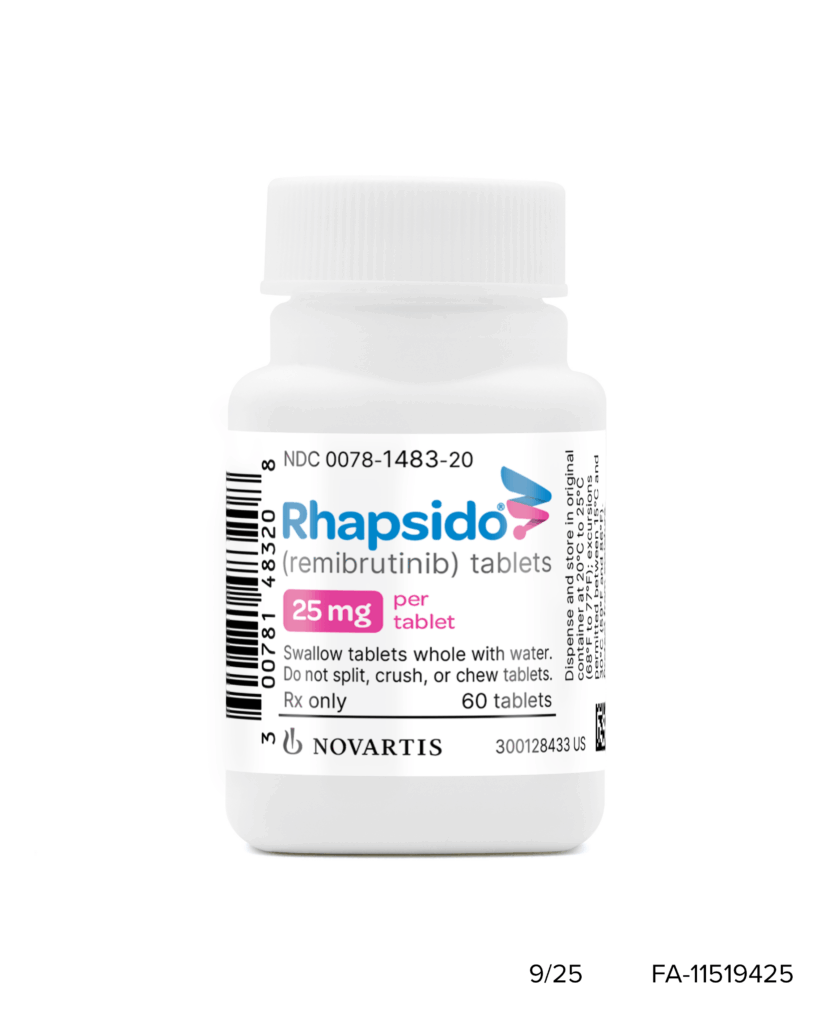The U.S. Food and Drug Administration (FDA) has approved remibrutinib (Rhapsido, Novartis) as an oral treatment for adult patients with chronic spontaneous urticaria (CSU) who remain symptomatic despite H1 antihistamine treatment.
Remibrutinib is a pill taken twice daily and does not require injections or lab monitoring. It is the first FDA-approved Bruton’s tyrosine kinase inhibitor (BTKi) for CSU. Remibrutinib helps to inhibit the release of histamine and other proinflammatory mediators by targeting BTK.
CSU is a mast cell-driven condition thought to be caused by immune dysregulation. In people with CSU, the immune system can become activated through allergic (IgE) or autoimmune (IgG) pathways. This causes mast cells and basophils to activate the BTK protein. While not fully understood, it is believed that once activated, BTK leads to the release of histamine and other proinflammatory mediators that may cause the red, swollen, and itchy hives commonly seen in CSU, Novartis explains in a press release.
The FDA approval of remibrutinib in CSU is based on results from the Phase III REMIX-1 (NCT05030311) and REMIX-2 (NCT05032157) clinical trials in patients who remained symptomatic on second-generation H1 antihistamines. Remibrutinib demonstrated superiority in change from baseline vs. placebo in itch (ISS7), hives (HSS7), and weekly urticaria activity (UAS7) at Week 12. Significantly more patients treated with remibrutinib vs. placebo achieved well-controlled disease (UAS7≤6) as early as Week 2 and at Week 12, and about one-third of patients achieved complete absence of itch and hives at Week 12. Remibrutinib has a demonstrated safety profile that requires no lab monitoring. The most common adverse events (incidence ≥3%) were nasal congestion, sore throat, nasopharyngitis, bleeding, headache, nausea, and abdominal pain.
Experts React to ‘Landmark’ Approval
“Remibrutinib is a major therapeutic advance for the management of CSU,” says Jason Hawkes, MD, MS, a Dermatologist and Principal Investigator at the Oregon Medical Research Center in Portland, OR. “For patients, this highly selective BTK inhibitor represents a rapid-acting, needle-free therapy that works for both hives and angioedema. For providers, it represents a small molecule that interferes with a central, intracellular signaling pathway that is critical for mast cell degranulation, which drives the maddening symptoms of urticaria.”
“The long-awaited and eagerly anticipated approval of remibrutinib for chronic spontaneous urticaria is a major advance: Not only does it offer an oral option to add to optimized antihistamines, but it also ushers in a brand new mechanism of action. I could not be more excited,” says Ted Rosen, MD, a Professor of Dermatology at Baylor College of Medicine in Houston, TX, and the Medical Editor of the Dermatology Digest®.
“The FDA approval of remibrutinib for chronic spontaneous urticaria represents a landmark advance in our historically limited therapeutic armamentarium,” Adam Friedman, MD, FAAD, Professor and Chair of Dermatology at the George Washington School of Medicine and Health Sciences in Washington, DC, tells TDD. “For patients who have failed even four-fold the recommended dosing of second generation non-sedating antihistamines and even biologics, this new oral option targeting BTK signaling offers a unique intercellular mechanism that translates into rapid relief with a favorable safety profile.
“Having another disease designed and specific option ultimately translates to improving quality of life for those who have long suffered from uncontrolled disease,” he says.
“CSU is a serious disease that can cause debilitating symptoms and unpredictable flares. It’s difficult to diagnose and manage,” says Mark Lebwohl, MD, Dean for Clinical Therapeutics at the Icahn School of Medicine at Mount Sinai in New York, NY and member of the steering committee for the remibrutinib REMIX Phase III clinical trial program, in a news release. “Remibrutinib represents a new way of treating CSU. By blocking the activity of BTK, remibrutinib stops a key pathway of the immune response in CSU. This is an exciting new option that has the potential to help a broad range of patients get fast relief.”
“The approval of remibrutinib is an important development in CSU care. It quickly reduces symptoms, offering patients control of the hives and itching that they experience on a daily basis,” adds Giselle Mosnaim, MD, MS, an Allergist and Immunologist from Endeavor Health, Clinical Associate Professor at the University of Chicago Pritzker School of Medicine in Chicago, IL, and REMIX trial investigator. “This is significant because it expands beyond existing injectable treatments and gives patients an oral option that can easily be incorporated into their daily lives.”
“Many CSU patients feel misunderstood and settle for treatments that don’t fully meet their needs,” says Lynda Mitchell, CEO of Allergy & Asthma Network. “We support new treatment options that empower patients to choose what works best for them. This convenient new oral therapy offers a promising new way to manage CSU and potentially improve daily life for those living with this challenging condition.”
Novartis has completed regulatory submissions for remibrutinib for the treatment of CSU across many countries, including in the European Union, Japan, and China, with priority review granted in China.
Remibrutinib is being investigated in ongoing clinical trials across a variety of immune-related conditions, including chronic inducible urticaria (CIndU), hidradenitis suppurativa (HS), and food allergy.


